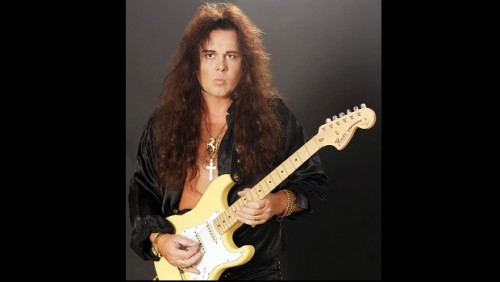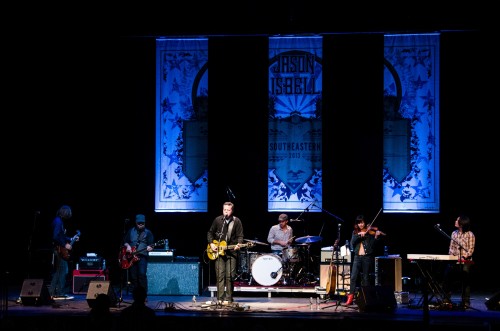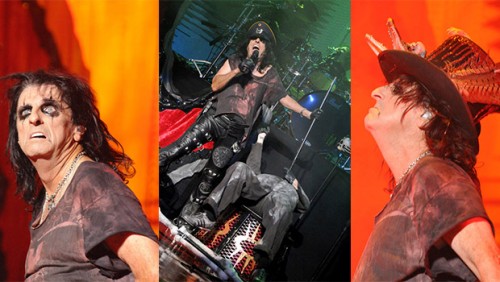By Michael Lello
Subtlety is not one of Yngwie Malmsteen’s strong suits. Known for his lightning-fast, classically influenced guitar shredding, the Swedish virtuoso is larger than life, whether playing through rows of Marshall amplifiers engulfed in stage smoke or enjoying the off-stage flash of his Ferrari and Rolex collections.
It’s fitting, then, that his new tour, which kicks off Thursday, June 12, at the F.M. Kirby Center in Wilkes-Barre, has an equally brash name: Guitar Gods. A perfect name for a tour headlined by the first guitarist to have his own Fender signature model and the musician whose name “Guitar Hero 2” uses to honor a gamer who hits 1,000 consecutive correct notes.
Malmsteen, calling to talk about the tour a few weeks before opening night, said he hadn’t formulated exactly how the concerts, which will also feature Bumblefoot of the current Guns N’ Roses incarnation and Gary Hoey, would be structured. And he said that’s how he generally approaches things.
“A lot of people probably get the idea that I’m this extremely calculated kind of guy, and in a lot of ways I am,” Malmsteen told Highway 81 Revisited while cruising around in a convertible in his adopted hometown of Miami Beach. “But when it comes to music or artistic expression, I’m very uncalculated and do things very spontaneous. If I didn’t do that, I wouldn’t want to do this anymore. I can’t just play the same thing over and over, it would drive me crazy.
“So for instance, if I do a regular show, like 20 minutes before the show, I say to the tour manager, ‘Here’s the setlist,’ and it’s not the same setlist as the night before. And I say to the tour manager, ‘Print them out and put them on the stage.’ So now everybody has a setlist. And once I hit the stage, I’ll play a different setlist anyway. If you go to two of the shows, they’re very different. This is how I keep the thing alive, this is how I stay inspired.”
He said the idea for the tour came “100 percent” from his his wife and manager April Malmsteen.
Uli Jon Roth, formerly of The Scorpions, was also slated to be on the bill, but on Monday he announced he was pulling out due to visa issues.
Emerging from the unlikely starting point of Sweden, Malmsteen pioneered the neo-classical movement within the world of heavy metal, taking an already guitar-driven genre to over-the-top levels. He came to the U.S. as an 18-year-old in the early 1980s, played in the band Alcatrazz and released his debut solo album “Rising Force” in 1984. Still beloved by fans 30 years later, the record garnered a Grammy nomination, and in 2009 Guitar World magazine placed it atop its Top 10 list of “guitar shred” albums. He’s since released nearly 20 more studio albums, most recently 2012’s “Spellbound.”
 “I got my first guitar when I was five years old, and the first thing I learned how to play was the blues, because it came natural to the instrument,” Malmsteen said. “By the time I was nine or 10 years old, I could play note for note everything (Ritchie) Blackmore played. We’re talking fucking exact. That’s pretty well-established for someone that young. What I realized, all of it was the pentatonic scale, and I felt it was very, very limited. It had a lot of the blues still, but I couldn’t base my whole thing on it.
“I got my first guitar when I was five years old, and the first thing I learned how to play was the blues, because it came natural to the instrument,” Malmsteen said. “By the time I was nine or 10 years old, I could play note for note everything (Ritchie) Blackmore played. We’re talking fucking exact. That’s pretty well-established for someone that young. What I realized, all of it was the pentatonic scale, and I felt it was very, very limited. It had a lot of the blues still, but I couldn’t base my whole thing on it.
“And my older sister, she would always bring home records, and I would hear like Genesis, and stuff like that, I’m talking early Genesis with Peter Gabriel, where they really had a lot of inversions and diminished notes, and I said, ‘Fuck, this is great!’ And I realized that my mom had about 200 Bach and Beethoven records, and I started listening to them. I was already decided on the Strat, the Marshall stacks – I wasn’t going to start playing the violin or anything. Then Vivaldi became very influential, and one day I heard Niccolò Paganini, I didn’t know who he was, but I thought, ‘Fuck, man, if I can get that sort of tonality and arpeggios (hums fast flurry of notes), fuck, that and Marshall stacks and double bass drums and smoke machines, I think this is something cool.’
“And of course everyone thought I was fucking crazy.”
Malmsteen said that in the 1970s in Sweden, “there was no such thing as being a musician.”
“It was a socialist mentality. You have to have a normal job, blah, blah, blah, blah. So it wasn’t very welcome to be a musician in the first place, but if you were you had to go a certain way — I went the exact opposite route. So people probably shook their head about what I was doing at the time. If you heard the really, really early shit I was doing when I was like 16, 17, years old, you can hear it, it’s already there.”
Malmsteen recounted these stories and more in “Relentless,” the memoir he published last year. Much had been written by others over the years about the flamboyant rock star, whose 1987 alone could fill a whole tome: he ended up in a coma and sustained nerve damage in his hand after crashing his Jaguar into a tree, lost his mother to cancer, discovered his manager had been ripping him off and had his home destroyed by an earthquake.
“I felt that I had to put this on paper from the only perspective from which it could be told, which is my perspective,” Malmsteen said. “I’m talking about walking in the snow when I’m seven years old and wondering what the fuck am I doing here, why am I born in this fucking place? And now of course I’m looking at palm trees, so now I’m remedying that; I’m still thawing out. But the thing is, it has to be read to understand where I’m coming from.
“It’s not just all the chicks – it was that too, you know the rock ’n’ roll thing? I did all that fucking shit. Trust me. I’m a very different person now. I don’t touch alcohol, I don’t touch cigarettes, I don’t touch drugs. I’m a very clean living person for the last 10 years, maybe more now. I just felt it had to be told. It’s so different from where I started. When I looked back, I said, fuck, that was me? It’s very therapeutic as well.”
Malmsteen is currently mixing a live album and DVD recorded at back-to-back shows in Tampa and Orlando. He says it’ll be released in August and will probably be called “Spellbound Live.”
While Malmsteen could have found a large audience on skill alone, he also spices up his act with a healthy dose of showmanship, playing behind his back, with his teeth and running the length of the stage.
“When I was a little kid I saw a film, ‘Monterey Pop,’ and I saw Jimi Hendrix and I also saw Pete Townsend,” said Malmsteen. “They were fucking whacking the guitars in the air, smoke machines and shit. I said, ‘This is cool, man. I want to do this!’ The musicianship is very, very important, because without that you’re nothing, but you have to have the visual as well. To me, that’s entertainment. I enjoy that, and I enjoy doing it myself. I like to think about what I’d like to see if I went to a show.”




[…] Swedish guitarist Yngwie Malmsteen has revealed to Highway 81 Revisited that he is currently mixing a live album and DVD recorded at back-to-back shows in Tampa and […]
Quote – “the first guitarist to have his own Fender signature model”.
No – that would be Eric Clapton
[…] legendary Swedish guitarist Yngwie Malmsteen has revealed to Highway 81 Revisited that he is currently mixing a live album and DVD recorded at back-to-back shows in Tampa and […]